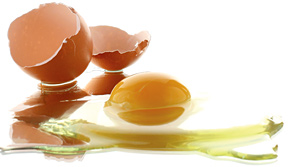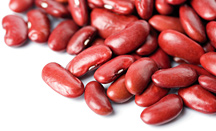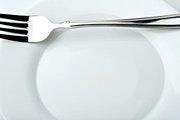The Power of Protein
Give Your Body What It Needs Every Day
By Dr. Donald L. Hayes
The word protein is of Greek origin, from the word proteios, which means "of prime importance," and when it comes to the human diet, protein's importance cannot be understated. Examples of proteins in our bodies that make life possible are hormones, enzymes, muscles, tendons, cartilage and other types of structural tissues and transport molecules. Proteins are constructed as long chains of amino acids, of which there are eight that must be provided by the food we eat. They are called "essential" because our bodies cannot make them. If our food lacks enough of even one of these eight essential amino acids, then the body will have a harder time making new proteins.
Why does the body need new proteins? Because our body's protein tissues wear out on a regular basis and must be repaired and replaced. This replacement process is accomplished by eating foods that contain protein. After eating protein, the digestive system breaks it down into a brand new supply of amino acids that become the building blocks that are used in repairing and replacing those that are worn out.
Various food proteins are said to be of different quality, depending on how well they provide the amino acids needed to repair our body's tissues. Simply put, what quality really means in this context is the ability of the food protein we eat to provide the right kind and amount of amino acids for our body to repair worn-out tissues. Let's compare a few different types of protein and see why the concept of protein quality is more complicated than it seems when it comes to our health.
Animal Protein: The Highest Quality Protein Isn't Always the Healthiest
Most animal-based foods can be used very efficiently by our body because they have the right amounts of each essential amino acid, and therefore are often referred to as "high quality." Among animal foods, the proteins of milk and eggs represent the best amino-acid matches for our body and thus are considered the highest quality. Plant proteins are often referred to as "lower quality" because some individual vegetables may have a low level of one or more of the essential amino acids (although as a group plant-based proteins do contain all eight essential amino acids).
 It would be great if the highest quality protein equaled the greatest health, but it doesn't, and that's why the term quality is misleading. In fact, compelling research shows that "low-quality" plant-based protein, which allows for slow but steady repair of new body tissues, is the healthiest type of protein. Chronic inflammatory conditions exist in millions of Americans who eat too much dietary animal protein. Just consider the number of allergy-related symptoms attributed to consumption of milk-based protein (milk, cheese, etc.) and the cholesterol- and fat-related conditions caused by consumption of eggs and red meat.
It would be great if the highest quality protein equaled the greatest health, but it doesn't, and that's why the term quality is misleading. In fact, compelling research shows that "low-quality" plant-based protein, which allows for slow but steady repair of new body tissues, is the healthiest type of protein. Chronic inflammatory conditions exist in millions of Americans who eat too much dietary animal protein. Just consider the number of allergy-related symptoms attributed to consumption of milk-based protein (milk, cheese, etc.) and the cholesterol- and fat-related conditions caused by consumption of eggs and red meat.
Clearly, animal protein is not the best for your overall health, at least not in the quantities consumed by most Americans. The RDA (Recommended Daily Allowance) for protein is 0.80 grams of protein per kilogram of body weight per day, which is an RDA of about 54 grams a day for a 150-pound adult. And the U.S. Surgeon General's Report on Nutrition and Health in 1988 stated, "The average man in the U.S. eats 175% more protein than the Recommended Daily Allowance and the average woman eats 144% more."
Plant Proteins: The Best Option for Your Protein Needs?
We now know that through enormously complex metabolic systems, the human body can derive all the essential amino acids from the natural variety of plant proteins we encounter every day. It doesn't require eating higher quantities of plant protein or meticulously planning every meal. Dean Ornish, MD, a graduate of Harvard Medical School, has proven that a change in eating habits can slow, stop and even reverse the most common and deadly diseases including heart disease, cancer and diabetes. Dr. Ornish in his latest book, The Spectrum, states; "in general, plant-based proteins are more healthful than those derived from animal sources."
 A Note About Soy Protein
A Note About Soy Protein
There is increasing controversy regarding the value of soy as a vegetarian protein option. On the positive side, soy is a bean and usually doesn't go through a lot of processing, so it retains all of the nutrients - proteins, fiber and the good fats. It also has vitamins and minerals. Soy proteins are very high in quality and they have a cholesterol-lowering effect, which is very heart-healthy. So much so that soy supporters suggest incorporating 2-3 servings of soy per day into diets. Supporters say clinical research studies show that soy does not lower testosterone levels, raise estrogen levels or affect sperm count.
However, there is also research out there that raises concerns regarding consuming this type of protein. For instance, one study showed that soy protein contains a natural chemical that mimics estrogen. Several cancer studies funded by the National Institutes of Health showed that estrogen-dependent tumor growth increased as the isoflavone content increased in the soy-based diet. (Journal of Nutrition, November 2001) Another study frequently referred to that was published in the Journal of Urology in April 2003; it states that a chemical found in soybeans (genistein) may contribute to the development of abnormal reproductive organs that may lead to sexual dysfunction.
Start Your Day Right
Eating breakfast is an important part of attaining and maintaining a healthy lifestyle, and studies show that eating a low-fat breakfast high in complex carbohydrates from fruits and vegetables and with at least some protein will help you lose weight. Many Americans routinely skip breakfast under the false belief that eliminating morning calories may help with weight loss. By choosing not to include breakfast, particularly breakfast that includes some protein, you may be putting your health in danger.
In fact, studies have shown that people who do not have protein at breakfast are more likely to be overweight, have less energy and have higher cholesterol levels than those who always eat a healthy, well-rounded breakfast. Research conducted at the University of Pittsburgh School of Medicine states: "Eating breakfast, particularly if it contains some protein, can hold off hunger for hours. Your body converts the amino acids from proteins into blood sugar. Amino acids act as tiny blood sugar time-release capsules that can keep you from overeating."
Don't know where to start when it comes to breakfast? Choose foods that are natural and unprocessed. Eat whole fruit rather than fruit juice. Whole fruits provide extra fiber. Protein sources include a variety of vegetables, eggs, fish, lean meat, seeds and nuts. If your excuse is that you don't have time to include healthy protein at breakfast, here's your answer: Try one of the many delicious tasting breakfast meal replacement shakes on the market. Make sure you choose a shake that is not loaded with chemicals and tons of sugar. With a little research you can find a great tasting vegetarian/vegan shake that uses plant proteins. Other key ingredients to look for include a super greens blend and essential fatty acids. A meal replacement shake can be made in a minute and fuels your body right through the morning. It's the ultimate fast food and so good for you. Ask your doctor for a recommendation.
Harness the Power of Protein
When it comes to protein, don't fool yourself, "fuel" yourself. Build a protein-based breakfast into your morning breakfast routine and make sure you get protein throughout the day. Remember, don't overload on animal-based protein; small amounts of lean meat like chicken, turkey or fish are OK (4 ounces a day at most), but make sure plant proteins form the staple of your diet. You'll look better, feel better and improve your quality of life, all at the same time.
 Creating a Complete Protein: The Story of Rice and Beans
Creating a Complete Protein: The Story of Rice and Beans
Rice and beans are a classic example of a complete protein dish. Separately, neither food contains all eight essential amino acids and are thus classified as incomplete proteins; but when combined (eaten together or within close proximity to one another), they form a complete protein that provides the body with the essential amino acids your body needs. (By the way, they are also a rich source of complex carbohydrates and nutrients, particularly whole-grain rice and whole beans prepared without lard.)
 The Essential 8: Amino Acids We Need to Get From Food
The Essential 8: Amino Acids We Need to Get From Food
There are 20 amino acids, of which eight are deemed essential because they cannot be synthesized by the body alone and thus must be provided by dietary sources. Here are the big eight, some of which you may recognize by name. (Note: Four other amino acids, arginine, cysteine, histidine and tyrosine, are required by infants and young children.)
| Isoleucine | Methionine | Threonine | Valine |
| Lysine | Phenylalanine | Tryptophan | Leucine |
Donald L. Hayes, DC, graduated from Western States Chiropractic College in 1977 and is the author of five health and wellness books including his latest, Weight Loss to Wellness. To learn more, visit www.greensfirst.com.

